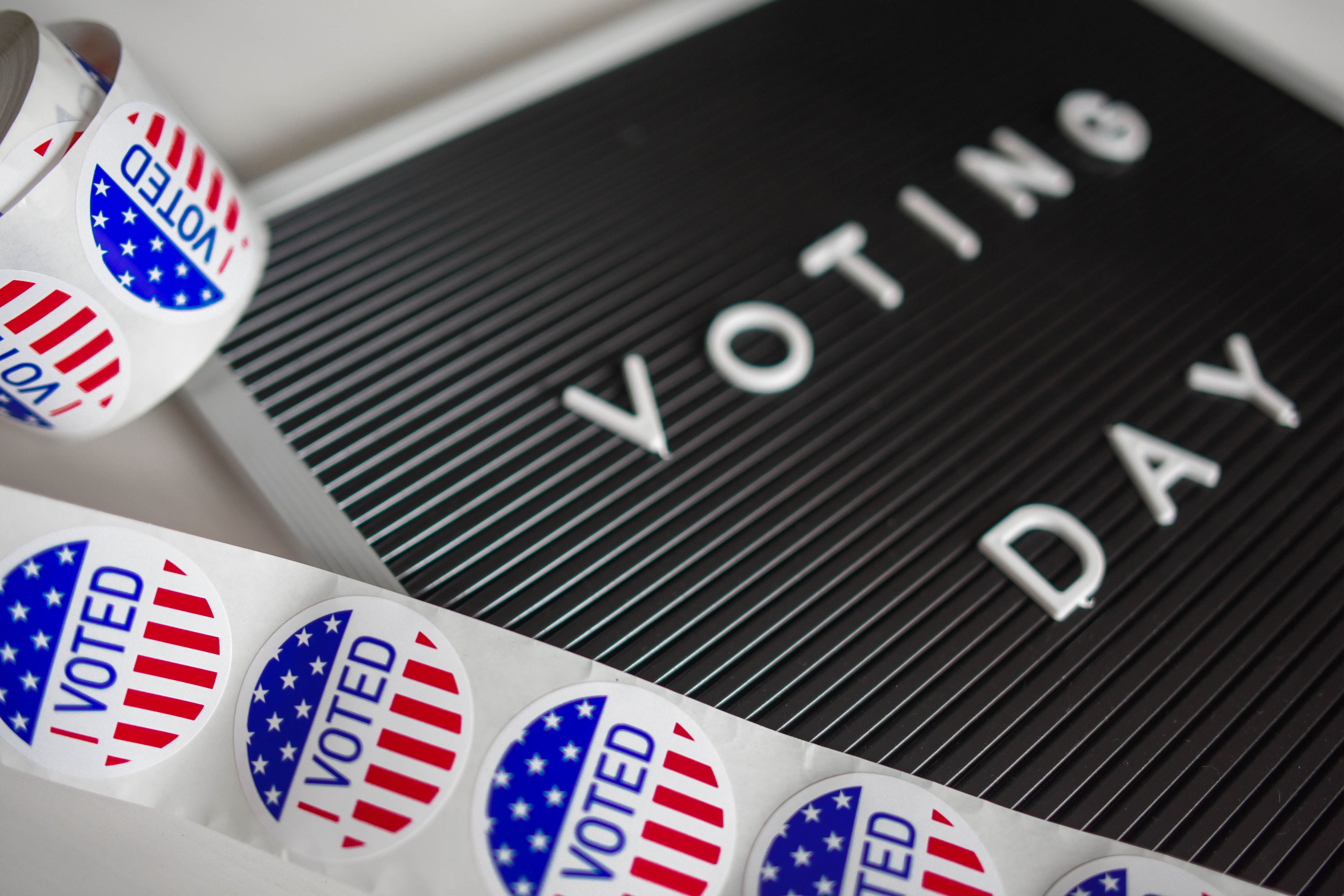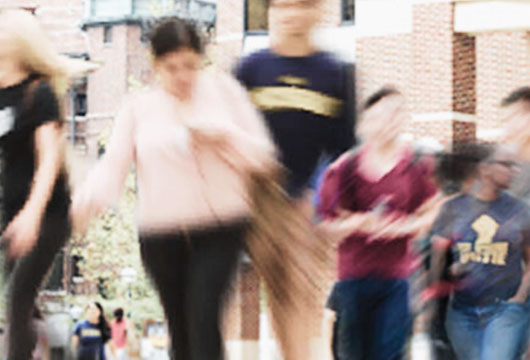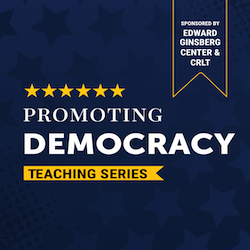| May 12-16: Elements of Equity-focused Teaching @ Michigan, May Series
|
| Navigating the Post-Election Period With Your Students
This piece is part of CRLT and the Edward Ginsberg Center's partnership to offer programming and resources for instructors around democratic and civic engagement through the Promoting Democracy Teaching Series. Instructors preparing to teach during the post-election period face a complex task that requires thoughtful preparation. To start, it is hard to anticipate how long the post-election period will last or how central it will be to public discourse. We may find ourselves with clear winners of major races on election night, in a short period of uncertainty as votes are processed and counted, or in a drawn-out post-election scenario, as results in key races are contested or litigated. Adding to the complexity, the events following election day will impact our students differently. Regardless of the outcome of major elections, some of our students will be disappointed. Moreover, the extent to which students are directly impacted by election outcomes—or by the heightened rhetoric of a prolonged post-election period—will vary depending on their identities, positionality, and individual circumstances. No matter where we find ourselves on November 6th, it’s safe to assume that our students will be learning in tumultuous times, and some will be experiencing heightened stress and strong emotions. In addition, for many of our students, this election will have been one of their first voting experiences. This post-election period may be important to their long-term democratic and civic engagement, and we can support them as they interpret post-election events and information, consider their implications, and reflect on the future of their civic engagement. As you support your students in this moment and navigate this teaching moment, consultants at CRLT and Ginsberg Center are available to talk with you about planning courses or class sessions. You can request a consultation with CRLT or use Ginsberg Center’s Support Request Form. Read more |
| Selecting Classroom Activities for Discussing Policy, Politics, and Social Issues
This piece is part of CRLT and the Edward Ginsberg Center's partnership to offer programming and resources for instructors around democratic and civic engagement through the Promoting Democracy Teaching Series. Our first piece, Preparing to Teach During the 2024 Election, provides a wider overview of the considerations. Class discussions on policy, politics, and social issues, including those related to the 2024 election, can support students in a range of ways. They can help students progress towards course learning objectives. They can also promote democratic engagement by fostering students’ confidence, motivation, and capacity to make informed decisions at the polls. Moreover, students may develop lifelong civic skills and mindsets through discussions of important issues of our time. Lastly, they can provide space for students to process election rhetoric, news, and results affecting them and their communities. To successfully support these goals, thoughtful design and facilitation of these discussions is crucial. CRLT and the Ginsberg Center have developed a framework for structuring classroom discussions around the election, relevant for any topic where the stakes are high for students, whether academically, socially, or in terms of the real-life consequences of broader debates and policy decisions. A key component of this framework is selecting activities that are aligned with your discussion’s learning goals. A well-aligned activity provides clear guideposts for students, helping them navigate complex and potentially contentious issues with purpose and direction. In this blog post, we consider five common learning goals for class discussions around policy, politics, and social issues. We highlight structures that facilitate each goal, as well as a few specific activities that offer practical options for your class discussions, including those leading up to and following election day. Read more |
| Preparing to Teach During the 2024 Election
CRLT and the Edward Ginsberg Center are partnering to offer programming and resources for instructors teaching during the 2024 election through the Promoting Democracy Teaching Series. As part of this collaboration, we are refreshing our guidance from recent presidential elections. While many of the strategies in our earlier entries remain as best practices, this updated piece also reflects our ongoing efforts on the topic, adapted for the current political environment. Read more |
| May 13-17: Hot Topics in Equity-focused Teaching @ Michigan, May Series Now in its eighth year, this annual series of workshops is open to all U-M instructors. Each workshop offers opportunities to engage with colleagues from across the university and to think through a range of timely equity-focused teaching questions, challenges, and strategies. You are welcome to register for one or all of the workshops in this one-week series. Sessions are free and open to U-M instructors in any field. Read more |
| Engaging Students by Integrating Career Development into Your Course
Guest Author: Paul Barron, LSA Opportunity Hub We’re heading towards that point in the semester where students’ engagement may wane as they juggle competing deadlines and responsibilities. While it can help to revisit the syllabus and remind students of upcoming deadlines, another way to promote engagement is to address a topic they’re stressing about: looking for jobs and internships. This blog post offers a range of ways that instructors can help students identify links between their courses and their future careers. For more ideas, and to spend time considering approaches to engaging students in your course by connecting it to their career exploration, register for this CRLT workshop: Engaging Students by Integrating Career Development Into Your CourseFriday, October 27, from 12:00 pm - 02:00 pm (lunch provided). Read more |
| Equity-Focused Teaching at Michigan: Investigating our Practices
Read more |
| Reframing Rigor to Promote Equity in Teaching and Learning
How might we conceptualize rigor in a college teaching setting? At a minimum, it would involve thoughtfully chosen, clearly laid out learning goals, targeted assessments of those goals, and learning activities designed for students to reach those goals, independent of student demographic or background. The design and implementation of a rigorous course would be grounded in the scholarship of teaching and learning for the discipline. Additionally, an indicator of rigor would measure how many students (and by how much) have pushed the boundaries of their knowledge, skills, and attitudes in order to meet the course objectives. Read more |
ChatGPT: Implications for Teaching and Student Learning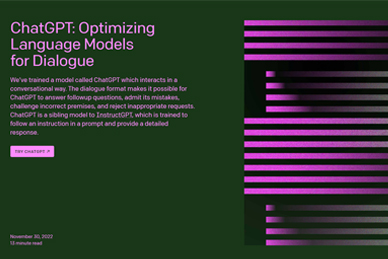 Recently, the artificial intelligence app ChatGPT has been making headlines in the higher education media and beyond. Some have taken an alarmist approach, such as a recent Atlantic piece titled “The College Essay Is Dead.” Others have been more sanguine, examining the limitations of the app as well as offering suggestions for how it can inform student learning and writing. Below is an FAQ about ChatGPT that includes links to useful resources. Read more |
| Structuring Classroom Discussions About Elections
This midterm election season brings an important opportunity for students and instructors to connect classroom learning to the value of civic engagement. Developments in law and politics at the national level have highlighted the particular importance of state and local civic engagement. The Center for Research on Learning and Teaching works with instructors to think through approaches to incorporating discussion of the midterm election and its links to civic engagement into their courses, as well as strategies for responding in the moment when these issues arise. Encouraging students to engage in the US democratic process is a non-partisan activity This post shares highlights from resources curated for faculty and staff to not only encourage voter engagement, but also to support the development of students’ habits of democracy before and after the upcoming election. Regardless of citizenship status, domestic and international students benefit from understanding how democracy works. Read more |


 /* Fix details summary arrow
not shown in Firefox
due to bootstrap
display: block;
*/
summary{
display: list-item;
font-size: 14pt;
font-family: arial;
color: #0174bb;
}
.sup {
font-size: .5em;
line-height: 0;
position: relative;
vertical-align: b
/* Fix details summary arrow
not shown in Firefox
due to bootstrap
display: block;
*/
summary{
display: list-item;
font-size: 14pt;
font-family: arial;
color: #0174bb;
}
.sup {
font-size: .5em;
line-height: 0;
position: relative;
vertical-align: b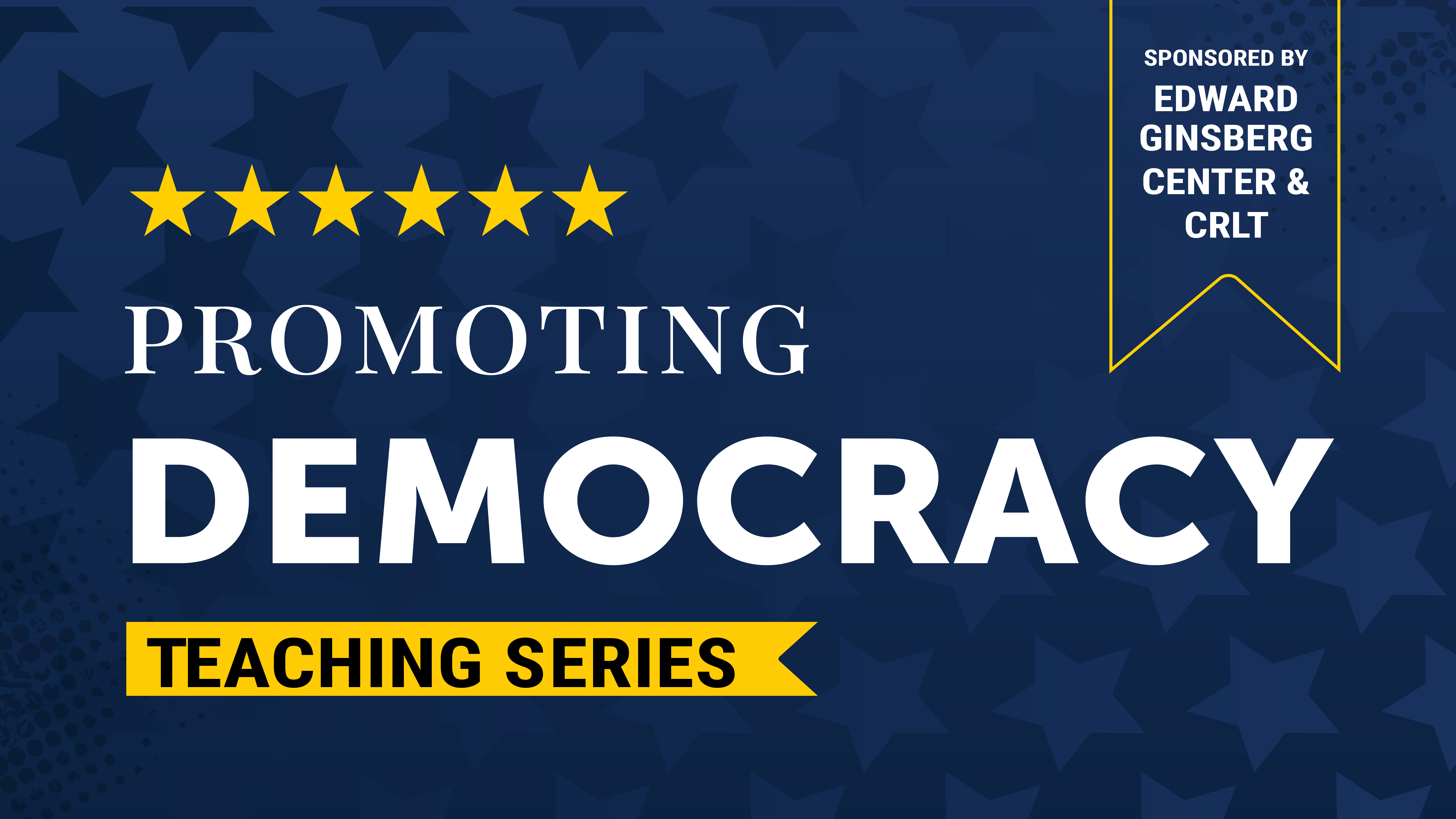
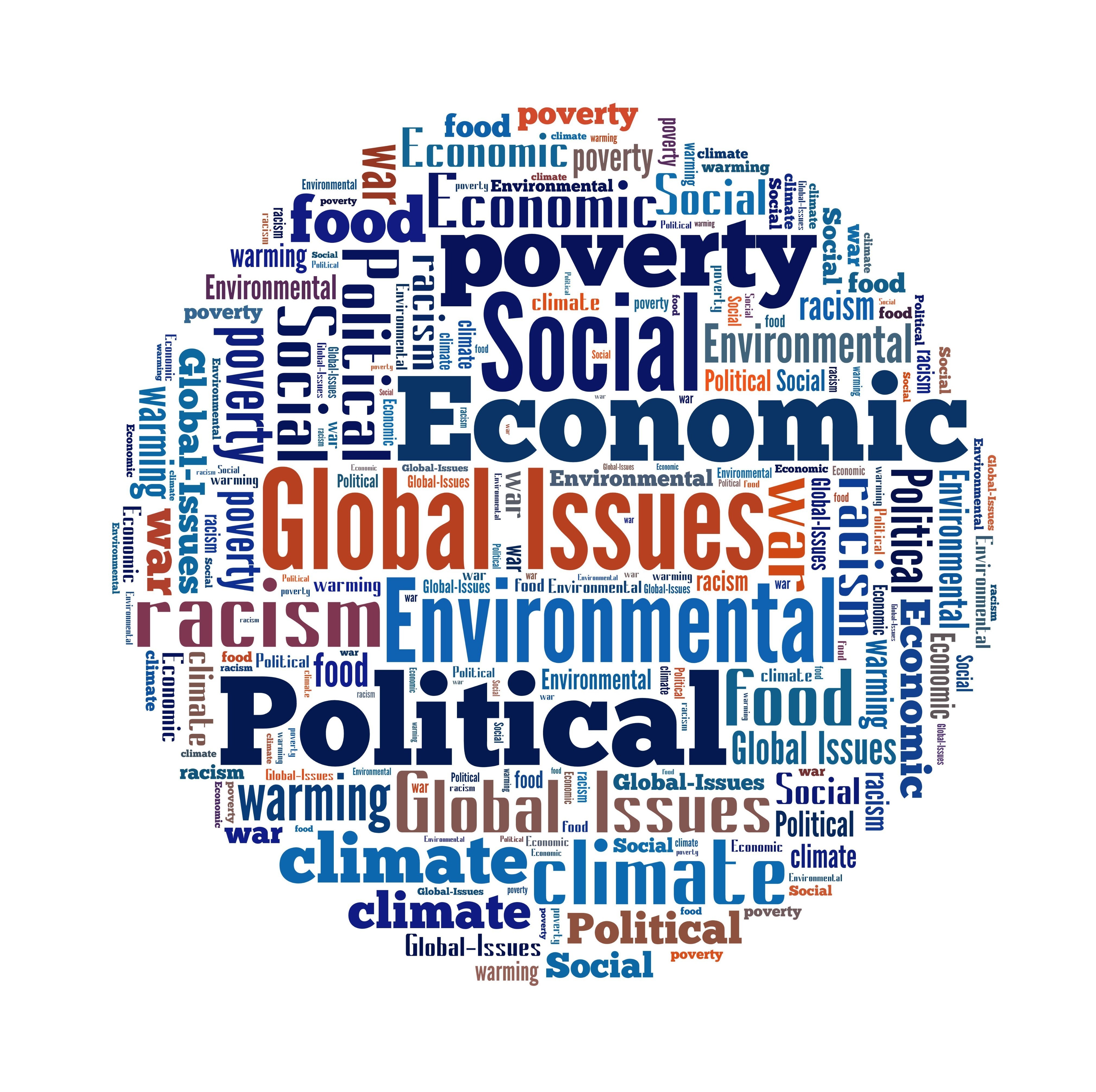
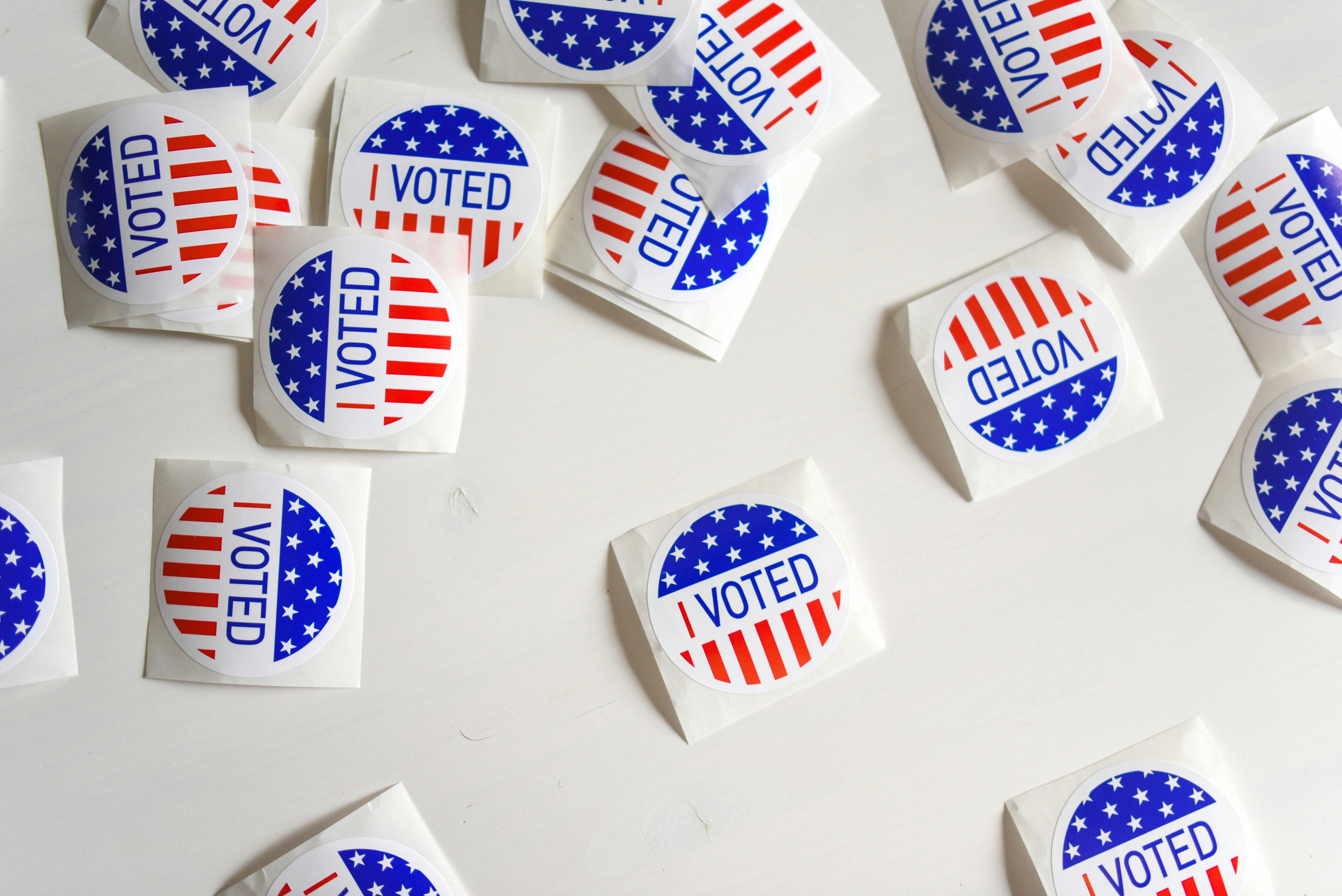
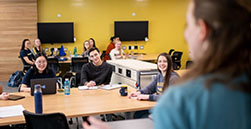
 At CRLT we continue to develop our understanding of equity-focused teaching as an ongoing process of learning from doing, reflecting on our impact, and critically investigating our practices. This year’s Equity-focused Teaching at Michigan May Series aims to foster critical reflective practices as a central component of Equity-focused Teaching. Using the lens of “practice” means we can think critically about the patterns of inequity and power that take shape in often subtle yet impactful ways through our actions over time. Critical reflection is the work of actively examining and unpacking these patterns, using our experiences as evidence, in dialogue with others’ perspectives and knowledge.
At CRLT we continue to develop our understanding of equity-focused teaching as an ongoing process of learning from doing, reflecting on our impact, and critically investigating our practices. This year’s Equity-focused Teaching at Michigan May Series aims to foster critical reflective practices as a central component of Equity-focused Teaching. Using the lens of “practice” means we can think critically about the patterns of inequity and power that take shape in often subtle yet impactful ways through our actions over time. Critical reflection is the work of actively examining and unpacking these patterns, using our experiences as evidence, in dialogue with others’ perspectives and knowledge.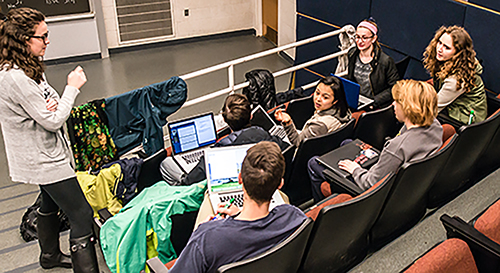 In scientific research, rigor refers to the level of care and precision used in the design, execution, and interpretation of experiments and studies. For example, the National Institute of Health (NIH), a major funding source for medical and biological sciences, requires grant applications and progress reports to adhere to a strict standard of rigor. In this setting, scientific rigor is defined as: “the strict application of the scientific method to ensure unbiased and well-controlled experimental design, methodology, analysis, interpretation and reporting of results.” While this definition is STEM specific, descriptions of rigor in other disciplines also focus on thoughtfully executing one’s work, ensuring it is grounded in scholarship, and examining one’s biases in analysis and interpretation (e.g., see Gill & Gill, 2020; Langtree, Birks, & Biedermann, 2019; and Riggs & Büchler, 2007).
In scientific research, rigor refers to the level of care and precision used in the design, execution, and interpretation of experiments and studies. For example, the National Institute of Health (NIH), a major funding source for medical and biological sciences, requires grant applications and progress reports to adhere to a strict standard of rigor. In this setting, scientific rigor is defined as: “the strict application of the scientific method to ensure unbiased and well-controlled experimental design, methodology, analysis, interpretation and reporting of results.” While this definition is STEM specific, descriptions of rigor in other disciplines also focus on thoughtfully executing one’s work, ensuring it is grounded in scholarship, and examining one’s biases in analysis and interpretation (e.g., see Gill & Gill, 2020; Langtree, Birks, & Biedermann, 2019; and Riggs & Büchler, 2007).